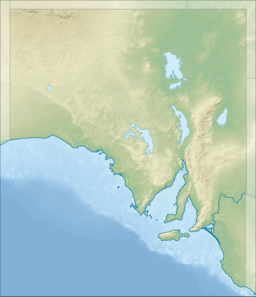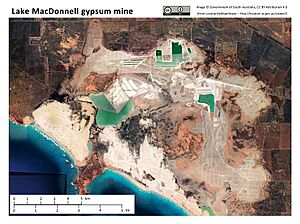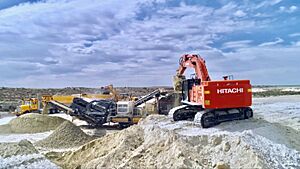Lake MacDonnell facts for kids
Quick facts for kids Lake MacDonnell |
|
|---|---|
| Location | Eyre Peninsula, near Penong, South Australia |
| Coordinates | 32°02′34″S 133°00′04″E / 32.042841°S 133.00122°E |
Lake MacDonnell is a special salt lake located on the western side of the Eyre Peninsula in South Australia. It's quite close to the huge, flat area called the Nullarbor Plain. The nearest town is Penong, which is about 13 kilometers (8 miles) north.
This lake is famous for its mining history. It used to be a salt mine, but now it's home to Australia's biggest gypsum mine. In fact, it holds the largest gypsum deposit in the entire Southern Hemisphere! While gypsum is the main product, salt is still collected here too, but in smaller amounts.
Contents
What is Gypsum and How it Formed?
Gypsum is a soft mineral that is used in many things, like plasterboard for building houses. The gypsum at Lake MacDonnell formed a long time ago, during a period called the Holocene.
The gypsum here is found in layers. There's a one-meter-thick layer of a type of gypsum called gypsarenite. This layer is made of 93 percent pure gypsum, which is also known as calcium sulphate. Below that, there's an even thicker layer, about 5 meters deep, of another type of gypsum called selenite. This selenite layer is even purer, containing 94-96% calcium sulphate.
Scientists believe this area holds a massive amount of gypsum. There could be as much as 500 to 700 million tonnes of it spread over an area of 87 square kilometers (about 33.5 square miles).
Mining Gypsum at Lake MacDonnell
People have been mining gypsum at Lake MacDonnell for a very long time, starting way back in 1919. Since 1984, the mine has been owned by a company called Gypsum Resources Australia (GRA). This company is a partnership between USG Boral and CSR Limited.
The mine produces a huge amount of gypsum each year, around 3.5 million tonnes (which is about 3.4 million long tons).
How Gypsum is Mined
Mining gypsum here is done using large machines like bulldozers and excavators. Once the gypsum is dug up, it's piled into big stacks. These piles are left for several years. This allows natural rainfall to wash away any salt that might be mixed in with the gypsum.
After the salt has been leached out, front-end loaders are used to load the clean gypsum onto trains.
The Gypsum Railway
The gypsum travels about 64 kilometers (40 miles) from the mine to the port of Thevenard by train. This railway is special because it's not connected to the main railway network. It's operated by a company called Aurizon.
Usually, three trains run every weekday, carrying the gypsum. On weekends, there are fewer trains. Once the gypsum reaches Thevenard, it's stored there in large piles again. From Thevenard, it's loaded onto ships. These ships then take the gypsum to Glebe Island in Sydney for more processing.
The Kevin Railway Terminus
The end point of the railway line at the mine is named Kevin. This name comes from an old land division called the Hundred of Kevin. That area was named after the adopted son of a politician from the 1800s, Charles Kingston.
This railway line was once part of the Port Lincoln Division of the South Australian Railways. The "station" at Kevin was very simple, just a small shed made of corrugated steel. It was rarely used by people because there weren't many settlements nearby.




